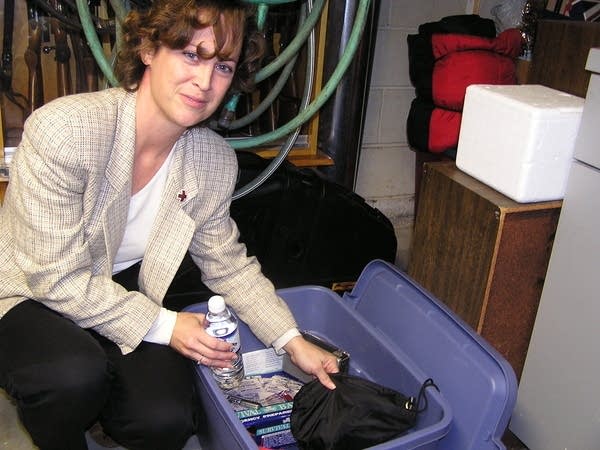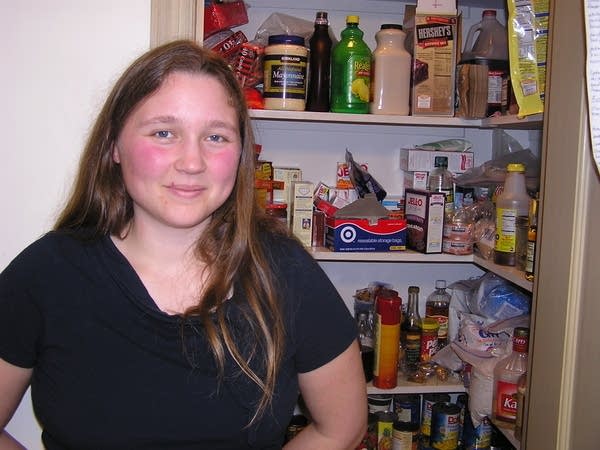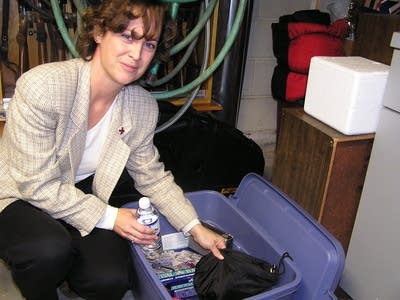Ready for a pandemic?
Go Deeper.
Create an account or log in to save stories.
Like this?
Thanks for liking this story! We have added it to a list of your favorite stories.

For Nancy Doucette of Brooklyn Center, the government's pandemic message is like preaching to the choir. Doucette works at the American Red Cross, so not surprisingly she has a well stocked emergency supplies kit. She keeps it stashed in her basement.

"I warn you," she says. "It is definitely a back storage room."
The kit is in a plastic tub tucked under the staircase. Douchette ducks her head under the stairs and pulls the tub free from a pile of sleeping bags to reveal its contents.
"Water, radio with batteries. We've got an extra emergency blanket, just little things in here," says Douchette. "Candles and matches. Oh, and flashlights."
Turn Up Your Support
MPR News helps you turn down the noise and build shared understanding. Turn up your support for this public resource and keep trusted journalism accessible to all.
"It's good to have built-up a reservoir of extra food so you don't have to run out to expose yourself to the public."
There's also some hard candy that won't spoil and sunflower seeds for protein. A few feet away, a pantry bulges with canned tomatoes, soup, jellies and dry cereal.
When Doucette put together this emergency shelter a few years ago, she was mostly concerned about tornados or ice storms. But she says it would be useful in a pandemic too.
"We'd at least have several days worth of food here," says Douchette. "It's good to have built-up a reservoir of extra food so you don't have to run out to expose yourself to the public on a daily basis to Cub Foods or wherever."

Doucette suspects her views put her in the minority. It's clear from her work with the Red Cross, she says, that many people don't have a pandemic plan, and that surprises her.
"The government is not going to be there for you. If there is a pandemic flu, people need to be prepared to respond individually because the government's going to be facing the 30, 40, 50-percent absentee rates that everyone else is going to be experiencing. And for them to maintain basic services is going to be a huge challenge," says Douchette.
Federal officials, including U.S. Health and Human Services Secretary Mike Leavitt, say a worst-case pandemic scenario could cause much of the country to simply shut down for a period of time. If millions of workers become sick with avian flu or stay home because they're worried about contracting the virus, many businesses won't be able to function the way they do today.
"I think I'll wait until I start seeing cases in the United States before I run out to the store."
Stores might run low on food. Gas stations might run out of fuel. Utility services could be interrupted. And since flu is so contagious, the domino effect could happen quickly, which is why officials want Americans to prepare.
Maria Almli of Chaska has been trying to do her part to prepare for a possible pandemic. She has enough canned food to feed her family of four for a week.
"There's all the pineapple. And lots of beans, tomato sauce and things for chili, pasta, canned fish," says Almli.
Besides her canned food stores, she bought two five-gallon containers of water that she bottled herself at the grocery store. But after it sat in her basement for six months, she decided to use the water.

"We gave it to the plants because I figured it wouldn't last that long," says Almli. "I mean that's the other thing. How long does bottled water last? I don't know."
Almli is trying to do things that make her feel more secure. But it's been frustrating. She would like to set up a semi self-sufficient hobby farm with a garden, a source of water and natural heat. But a hobby farm is out of her reach financially. So she's been thinking of other things she can do.
"If I do something I want it to be something that would actually matter instead of something that would just make me feel better," says Almli. "And right now I don't know what that is other than hand-washing."
Almli isn't hand-washing just to prevent avian flu, since the virus isn't in the U.S. yet. She's improving her hygiene and helping fend off other illnesses. But Almli says, all the washing has made her hands quite chapped.
In contrast to Almli and Doucette, there are some people who have done nothing to prepare. David Fullerton is one of them.
"If that helps them, if that relieves some sense of anxiety for them, great," says Fullerton. "I don't have a great sense of anxiety about it."
Fullerton, who lives in Arden Hills, is not convinced there will be a pandemic.
"It comes down for me to probabilities," says Fullerton. "What's the likelihood? And there are certain things I'm going to set aside time and space and energy and worry for and avian flu isn't one of them."
Fullerton says he doesn't think it's bad if people stockpile food and water. He says they might need it if a tornado or flood hits their home. That's a much more likely scenario to him than a disease outbreak.
Then there are people like Marv Mitchell, of Rochester. He believes a pandemic is a real possibility. He has been tracking the progress of avian influenza on news reports.
But Mitchell hasn't taken any steps yet to prepare for an outbreak.
"I think it's a little early. We'll see what happens with the spring migration when the birds start coming north from Africa into Europe, if it starts looking like it's gonna get bad. But I think I'll wait until I start seeing cases in the United States, you know a few cases, before I run out to the store," says Mitchell.
That's not what federal officials hope to hear. They're worried that too many people are waiting until avian influenza reaches this country before they do anything to prepare.





